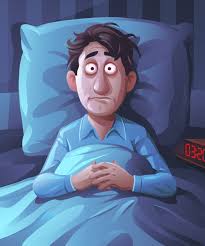Are you Getting Adequate Sleep?!
- 09/13/2020
- Fitness
- Health & Wellbeing
- Nutritional Challenge
Adequate Sleep  How to Accomplish?
How to Accomplish?
Through research it is recommended the average adult needs to get 7 to 8 hours of sleep. Due to hectic lives of modern technology, this can be difficult. However, it is just as important to develop a schedule of adequate sleep time as it is to eat healthy and to exercise. On the other hand, how many times have you gone to bed at the right time to be able to obtain this adequate amount of sleep, but just cannot fall asleep or stay asleep?! Unhealthy daytime habits and lifestyle choices can leave you tossing and turning at night and adversely affect your mood, brain and heart health, immune system, creativity, vitality and weight.

Experiment with the following tips to assist you in enjoying better sleep at night:
1 – Get in sync with your body’s natural sleep-wake cycle (Circadian rhythm)
- This is one of the most important strategies! If you keep a regular sleep-wake schedule, you’ll feel much more refreshed than if you sleep the same number of hours at different time, even if you only alter your sleep schedule by an hour or two.
- Try to go to sleep and get up at the same time every day.
- Choose a bed time when you normally feel tired so that you do not toss and turn.
- You should be able to wake up naturally without an alarm. If you need an alarm then you may need an earlier bedtime
- Avoid Sleeping in – even on the weekends!
- If you need to make up for a late night, choose a daytime nap rather than just sleeping in. This will help to maintain your natural sleep-wake rhythm
- Be smart about napping
- Limit naps to 15 to 20 minutes in the early afternoon
- Fight after-dinner drowsiness
- Get up and do something mildly stimulating, such as washing the dishes, calling a friend; this will prevent you from waking up later in the night and have difficulty getting back to sleep
2 – Control your exposure to Light
Melatonin is naturally secreted by your brain and increases when it is dark (making you sleepy) and less when it is light; however aspects of modern life can alter the body’s production.

- How to influence your exposure to light:
- During the Day:
- Expose yourself to bright sunlight in the morning
- Spend more time outside during the daylight
- Take work breaks outside
- Let as much natural light into your home or workspace as possible
- At Night:
- Avoid bright screens 1-2 hour prior to your bedtime
- Includes phone, tablet, computer, and TV is especially disruptive
- Try using devices with smaller screens, turning the brightness down
- Say no to late-night television
- Try listening to music or audio books instead
- Don’t read with backlit devices
- Make sure the room is dark
- Keep the lights down if you get up during the night
- Avoid bright screens 1-2 hour prior to your bedtime
- During the Day:
3 – Exercise During the Day
- Improves the symptoms of insomnia and sleep apnea and increases the amount of time you spend in the deep, restorative stages of sleep
- Try to finish moderate to vigorous workouts at least 3 hours before bedtime
4 – Be Smart about what you Eat and Drink
- Limit Caffeine and Nicotine
- Caffeine can cause sleep problems up to 10-12 hours after drinking it
- Avoid big meals at night
- Avoid Alcohol before bed
- Interferes with your sleep cycle once you are asleep
- Avoid drinking too many liquids in the evening
- Cut back on sugary foods and refined carbs

5 – Wind Down to Clear your head
- Residual Stress, Worry and anger can make it difficult to stay asleep
- Deep Breathing Exercises
- A body scan (focusing on different parts of your body where you hold stress)
6 – Improve your Sleep Environment
- Keep your room dark, cool and quiet
- Keep noise down or mask it with a fan or sound machine
- Keep room cool – around 65 degrees F
- Make sure your bed is comfortable
- Reserve your bed for sleeping sex
7 – Learn ways to get back to sleep: https://www.helpguide.org/articles/sleep/insomnia-causes-and-cures.htm

- Stay out of your head – try not to stress about falling back asleep again
- Try the breathing exercises above again
- Make relaxation your goal, not sleep
- Do a quiet, non-stimulating activity
- Such as reading a book
- Postpone worrying and brainstorming
- Make a brief note of the problem or great idea on paper to allow yourself to worry about it the next day
Benefits of getting enough sleep:
- Improves immune system and decreases risk of getting sick
- Promotes proper body metabolism and assists you to stay at a healthy weight
- Lowers risk for disease such as diabetes and heart disease
- Reduces your stress and improves overall mood
- Allows for increased focus and mental clarity
- Allows for healthy relationship and you to get along better with people
Sleep Resources:
https://www.cancer.org/latest-news/how-to-get-more-sleep.html